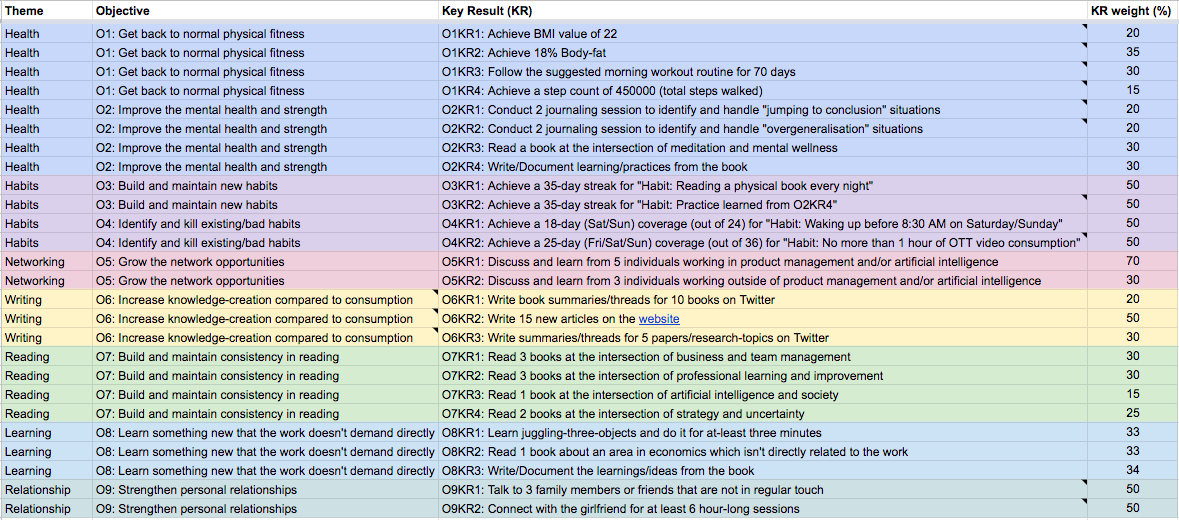Setting up personal OKR [JFM-2021]
This article describes the approach I’m following to set personal goals for myself, in the form of Objectives and Key-results (OKR).
If you are new to OKR, scroll down to the Resources section for more details.

A publically available worksheet for my personal OKRs for January-February-March 2021 is available here.
I’ve worked them out in order to:
- Get a better grip on the concept by implementing them in a relatively newer setting/environment outside of the work
- Effectively set goals in the personal life where it’s easy to measure progress and find out weeker/strong areas to work on
I will continue updating this article and the attached document in case of any changes or updates. If you want to discuss more, or in case of any feedback, please reach out to me at @hackpravj
Themes
Start with the themes representing the different areas of life. For example, in your case, it can be Personal-finance, Health, Creativity, and more. You can have your own personal reasons behind selecting the final themes.
Here are the 7 separate themes in my current plan.
- Health
- Habits
- Networking
- Reading
- Writing
- Learning
- Relationships
Backlog
For each of the themes, I came up with a backlog of aspirations and ideas.
This has helped me connect the ideas with each other if there is any such possibility, OR ruling out ideas that are duplicate to each other.
Some of the themes or ideas that didn’t make it to the current plan, will be considered during the next quarter’s OKRs.
Objectives
To come up with the objectives associated with the themes, ask yourself
- Where do you want to reach? (in relation to this theme or some specific area related to the theme)
As a rule-of-thumb, objectives are ambitious and qualitatively represent an end state. It’s more of an outcome, rather than an output.
For example, if you’ve selected “Health” as one of the themes, the following can be an objective for you:
- Objective-1: Get in a better shape
Key-results
Once you’ve decided your objective, the key-results will be a mechanism to show your progress towards that objective.
To come up with the key-results associated with the objective, ask yourself
- How will I know I am getting there (reaching the objective)?
Key-results are milestones that will move you closer to the objective if achieved.
Considering the earlier example of the Objective (Get in a better shape), here are two representative key-results:
- Key-result-1: Reduce weight by 10 kilograms (or pounds)
- Key-result-2: Achieve a daily step count of 10K steps walked
Initiatives
Once you know the key-results, ask yourself the following question to come up with the initiatives:
- What are we doing to get there (to the milestone set by the key-result)?
One of the common mistake during OKR planning is; ignoring the difference between the initiatives/key-results.
For example, consider the first key-result (Reduce weight by 10 kilograms), there can be different initiatives (that you can do to reach the milestone set by the key-result).
- Initiative-1: Limit total meals per day to 2
- Initiative-2: Stop eating after 7 PM
- Initiative-3: Start intermittent-fasting every other day
OKR check-in
As you’re moving ahead with your OKR planning, you need to ensure that you’re regularly measuring your progress.
Measurement
- You can provide different weights to the key-results associated with an objective.
- For example, the first key-result (Reduce weight by 10 kilograms) can take up 70% (relatively higher) weightage than the second key-result (Walking 10K steps daily).
- The progress for a key-result can be measured based on the % completion of the same.
- A typically considered “sweet-spot” for OKRs is 60-70%.
- If a key-result’s progress is higher than 70%, it might be a sign of lower ambitious objectives.
Summary
- OKRs can also be implemented in personal life, out of the business/work (refer to Manas’s work on personal OKR [start] [final update]).
- They serve as a goal-setting tool that helps you assess your progress on a regular basis.
Resources
- Google’s guide to OKR
- OKR training session (YouTube playlist) by Directi CEO Bhavin Turakia
- I will be maintaining a Twitter thread for the same topic, here.
If you work at the intersection of Product-Management and Artificial-Intelligence, I would love to connect and exchange notes with you regarding your experience/learnings.
If you want to discuss more, or in case of any feedback, please reach out to me at @hackpravj